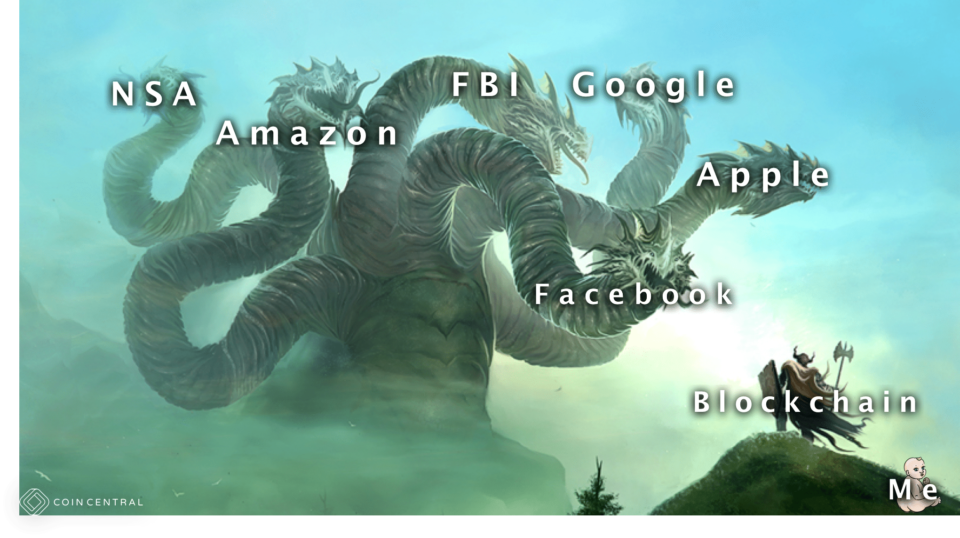- A Contemporary Upright History to Privacy
- When Files Will get Provoking ????
- Dim Replicate S04 E07: CHYYNA! 大哥
- Final Tips
This ain’t your granddaddy’s privacy battle.
Times were more objective appropriate when postcards were the massive privacy invasion alarm.
Today, our personal privacy is below siege by veiled govt surveillance applications and the endless tech company Trojan Horses.
Privacy, per Merriam-Webster, is defined as the quality or insist of being besides company or observation, or freedom from unauthorized intrusion.
Technical innovations within the previous twenty years derive blurred the traces of “besides company” and “unauthorized intrusion,” and now our personal privacy is below assault from just a few fronts.
Our locations are continuously being tracked on our telephones, that are borderline inseparable from our our bodies. We are below constant surveillance.
Social media platforms know more about us than we ought to composed be glad with.
Our sensitive knowledge is floating round and being exchanged for a myriad of unauthorized purposes.
Many personal privacy advocates derive taken to blockchain and cryptocurrency entrepreneurship to form alternatives that deal with the concerns of our dwindling correct to privacy within the digital world.
Technological advancements relish blockchain and nil-proof derive given the pro-privacy debate a new gust of wind. The incredible thing about these alternatives is that they provide encryption or now not lower than partial obfuscation on a huge scale.
Privacy coins equivalent to Monero and Zcash give us the freedom to transact without being tracked, but this might well perhaps additionally approach at the prohibitively excessive rate of empowering and enabling criminal activity.
Blockchain-essentially based fully mostly browsing and social media platforms relish BAT, Steemit, and Sapien provide an ruin out from a manipulative data-mining browsing and social journey.
 The following article explores the evolution of privacy in up to date society, how the digital world has warped the very fact of privacy and the rumbling dangers that approach with it, and how blockchain and cryptocurrency initiatives provide a solution.
The following article explores the evolution of privacy in up to date society, how the digital world has warped the very fact of privacy and the rumbling dangers that approach with it, and how blockchain and cryptocurrency initiatives provide a solution.
A Contemporary Upright History to Privacy
Privacy as all americans is conscious of it is a fairly most in vogue boost in human society. Our correct to privacy isn’t explicitly acknowledged in our Structure and has been essentially defined by objective appropriate precedents, many of which haven’t accounted for the quick societal alternate ushered in by the digital generation.
The upward thrust of a non-public tech oligarchy posed new paradigms in which a behind-involving bulwark of a govt is repeatedly taking half in a recreation of iron-fisted find-up.
The govt.is in a precarious insist in the case of meting out judgments against tech companies. These cases require gentle but decisive footwork to retain away from stepping over and stifling non-public endeavor, whereas concurrently holding civilians from a extraordinarily valid bogeyman within the dead of night.
The following are a handful of the coolest precedents which derive helped to dictate the put the US stands on personal privacy at the moment time:
- The Fourth Amendment to the US Structure (1791): “The correct of the oldsters to be stable of their persons, homes, papers, and effects, against unreasonable searches and seizures, shall now not be violated, and no Warrants shall distress, but upon seemingly space off, supported by Oath or affirmation, and namely describing the insist to be searched, and the persons or issues to be seized.”
- “The Real to Privacy” (1890): Regarded as one of basically the most influential essays in American guidelines, “The Real to Privacy” is without doubt one of many first articles advocating for an correct to personal privacy, and defined privacy as a “correct to be let alone.” Certainly one of many authors othe essay, Louis Brandeis, would later change into an influential Supreme Court Justice.
- Smith v. Maryland (1979): A case the solidified the “Third Occasion Doctrine,” Smith v. Maryland affirmed that “an particular person has no legitimate expectation of privacy in knowledge he voluntarily turns over to Third events.”
This data might well perhaps additionally very well be something else from cell-phone self-discipline data, bank data, the put you provided your closing cup of coffee, credit card data, and technically something else else given to Third events. The govt.is prepared to operate this knowledge without issues.
- Jones v. the US (2012): Police connected a GPS tracking tool to Antoine Jones’ Jeep and tracked his actions for weeks, affirming their suspicions of him being a drug dealer. The Supreme Court ruled that the GPS violated Jones’ correct to privacy, because it became physically placed on his property.
Essentially the critical takeaway right here is how there seem like barriers on the scalability of guidelines enforcement. Louis Menand mentioned in an article titled “Nowhere to Veil” in The Unique Yorker that the police might well perhaps additionally derive theoretically trailed Jones’ Jeep by automobile or helicopter, or better yet stationed an officer on every boulevard corner, and their evidence would derive been admissible in court docket.
The actual fact that the abilities became physically placed on the Jeep matters, but the line starts to blur. Our locations are continuously being tracked on our smartphones and wearables, and we don’t indubitably seem to mind. If fact be told, it’s somewhat the price-add to navigate the sphere by opening an app, or having your watch mean that that you simply can realize how much you didn’t instruct at the moment time.
Right here’s the put it will get valid: a little loophole within the judgments of Smith v. Maryland and Jones v. the US exposes anybody and all americans to mass surveillance. Your autonomy, privacy, and safety seem to hang by a thread if the government (or anybody) can fabricate salvage true of entry to to your self-discipline history and up to date self-discipline at any moment.
If the companies you give your self-discipline, thumbprint, and a form of such knowledge are regarded as as “third events”, then the government technically ought to composed be in a self-discipline to salvage true of entry to them if warranted.
- That brings us to the Apple-FBI skirmish following the San Bernadino massacre in 2015, when two terrorists, Syed Rizwan Farook and Tashfeen Malik, who murdered fourteen folks and wounded twenty-two, were killed. When the police retrieved Farook’s iPhone issues got sticky in digital world as soon as more, and we saw what CNBC known as “one of many most life like-profile clashes within the controversy over encryption and data privacy between the government and a abilities company.”
The Nationwide Safety Agency wasn’t in a self-discipline to free up the phone, so the FBI requested Apple to free up their very like tool. Apple declined on the root that the voice became “unreasonably burdensome,” and that it might well in all probability additionally lose potentialities if it allowed third events to free up their telephones. The case fleet started circulating courts, but the FBI stumbled on somebody who provided an unlocking tool and withdrew the case.
This arena is linked because it reveals that whereas your data would be for the time being preserved by whichever third occasion you’ve entrusted it to, this safety is subsequent on the government slicing block.
Cases equivalent to the FBI versus Apple squabble inspire paint the contest between anonymity and safety. The privacy debate in total ends in an unresolved quagmire; a insist of stasis that inevitably moves in direction of the extinction of privacy which capacity of quick advancements in abilities.
To retain away from complicating the distress, let’s utilize Occam’s razor to separate the distress of privacy into two straightforward camps: for (govt) energy and for (corporate) income.
The govt.s critical utility for surveillance is for administration, whether or now not that be holding its voters from injure or turning into some dystopian 1984 Orwellian authority.
A corporation’s critical utility for surveillance is to harvest and commoditize the data, whether or now not that be facilitating more worthwhile classified ads/gross sales or auctioning off user knowledge.
The evolution of data and privacy safety within each and each teams is attention-grabbing, but the case for govt energy takes the ethical pickle cake. The realizing for company income pales in contrast to the government’s tug of war between their tasks of safety and supporting their citizen’s rights.
![]()
Uncle Sam likely doesn’t give a shit within the occasion you provided a behind cooker on Amazon, nor does he are searching for to upsell you a cookbook in line with your browsing behavior.
A govt has a duty to retain its voters safe, and surveillance and data monitoring derive change into a significant tool to retain the criminal underworld at bay.
The actual fact is that the sphere might well perhaps additionally also be a atrocious insist, and now not all americans desires to preserve hands and tell Kumbaya. Human trafficking, child pornography, and terrorism are only about a of the wretched realities that governments across the sphere strive to quit and are in a self-discipline to manufacture so with life like success. Without some form of public surveillance, the government’s capacity to quit the contaminated guys is considerably undermined.
The guiding seek data from items itself: how will we retain energy (money, resources) away from the contaminated guys, and concurrently retain the objective guys from infringing on our privacy?
Essentially essentially based fully on a 2016 statement by the Assistant Secretary of the Treasury for Terrorist Financing, Daniel Glaser, ISIL (ISIS) raised a whopping $360 million in income per one year from taxing, extorting, and a form of activities.
This money became being feeble to fund the day-to-day activities, to boot as toughen ISIS terrorist cells across the sphere. The massive majority of this money is likely fiat and might well perhaps additionally doubtlessly be confiscated or throttled when tracked. The faster the money will get traced, the slower terrorism can unfold and lives are doubtlessly saved.
Nonetheless, what if ISIS were to salvage utilize of cryptocurrency, an in total untraceable monetary asset that might well perhaps also be despatched in huge sums from any place to any place at any time? The flexibility to ship an untraceable sum of cash almost straight away any place within the sphere is a most life like characteristic of personal cryptocurrency but might well perhaps additionally very well be catastrophic if utilized by criminals.
Privacy initiatives are decentralized and don’t derive a government to shut down any illicit activity. As that that you simply can bear in mind, this poses a huge distress for counter-terrorism models. Granting the government the flexibility to trace our transactions in alternate for saving our lives seems relish a more than gorgeous deal, but it certainly’s a terrible hedge against an all-grand totalitarian regime within the crash.
One aspect of the monetary tracking debate views privacy coins as unhealthy enablers of chaos and disorder, and rightfully so.
The a form of aspect of the controversy views privacy coins as what might well perhaps additionally doubtlessly be our closing beacon for future generations’ sovereignty, and rightfully so.
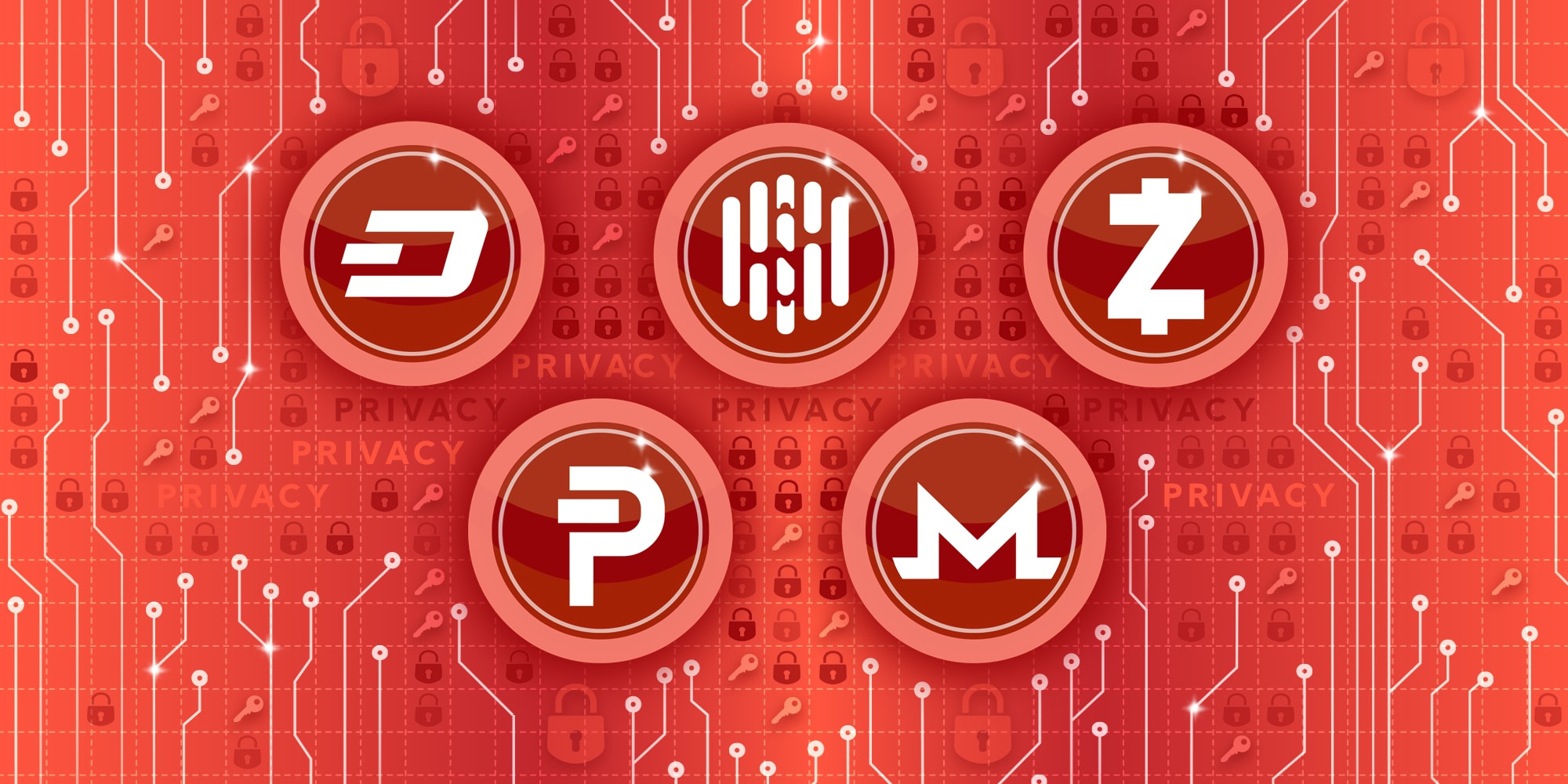
The flexibility to utilize our strong-earned profits as we please, within motive, is a major factor of our personal autonomy, and limiting it might well in all probability throttle our existence.
The more standard examples hover round transactional privacy and consist of privacy coins equivalent to Monero, Zcash, Traipse, and PIVX. The nucleus of the privacy characteristic is the utilization of stealth addresses, encryption, or some a form of form of identification covering characteristic to hide the identification of the user(s).
“Privacy might well perhaps additionally very well be an anomaly”
– Vinton Cerf, Co-creator of the militia’s early 1970s Web prototype and Google’s Chief Web Evangelist
Today’s companies seem to know us better than all americans is conscious of ourselves; relish a creepy neighbor that’s consistently attempting to salvage passable little focus on over with sell you something.
There’s little we can manufacture, or ought to composed manufacture, to quit companies attempting to salvage a income, but the quick advances in data collection and target audience targeting might well perhaps additionally derive provoking unintended consequences.
Companies relish Google or Fb don’t technically sell your data, but they manufacture salvage it on hand in ad networks to advertisers that utilize their ad-attempting to search out tools – and generate some meaty income doing so.
The higher data an organization has, the more instructed gross sales, marketing, and promoting decisions it is going to salvage. As antagonistic to throwing ad spaghetti on a wall and hoping something sticks, advertisers can tailor messages to a explicit centered target audience. Since these classified ads are more linked to those audiences, they veritably tend to amass the objective or provider.
“Files is feeble to better inspire more linked classified ads. I objective got an ad for dogs toys, which is big because I break my dogs. If there wasn’t any data to make utilize of, I could well perhaps additionally very well be getting something plot less linked relish classified ads for bargain oil changes from a restore store across the nation.”
– Troy Osinoff, Founder of digital marketing company JUICE and old Head of Buyer Acquisition at Buzzfeed
Whereas data will consistently play a needed characteristic within the user financial system, social media has elevated the flexibility to salvage data and raised the rate of collection to unprecedented ranges. Since the transition came about within the wake of the mountainous tag-add of social media, the standard particular person hasn’t indubitably been by how much of their data is continuously being aloof.
“Of us derive indubitably gotten at ease now not finest sharing more knowledge and a form of kinds, but more overtly and with more folks. That social norm is simply something that has developed over time.”
– Fb CEO Tag Zuckerberg in 2010.
The hazard of online companies luring you into new comfort zones and collecting your data is deeper than merely attempting to sell you stuff. The anguish lies when these big swimming pools of data are mismanaged and tumble into the hands of malicious third events.
Let’s explore.
In Might well presumably perhaps additionally objective 2018, an Oregon couple became at house speaking about hardwood floors. The husband bought a phone call from one of his workers in Seattle who acknowledged he bought an email with the fat dialog. The couple’s Amazon Echo (Amazon’s “neat speaker”), recorded the dialog and despatched it over.
Amazon’s explanation of the arena became as follows:
“Echo wakened which capacity of a phrase in background dialog sounding relish ‘Alexa.’ Then, the next dialog became heard as a ‘ship message’ inquire of. At which point, Alexa acknowledged out loud ‘To whom?’ At which point, the background dialog became interpreted as a title within the client’s contact checklist. Alexa then requested out loud, ‘[contact name], correct?’ Alexa then interpreted background dialog as ‘correct’. As now not going as this string of events is, we’re evaluating alternatives to salvage this case even less likely.”
Whereas this yarn alone ought to composed be unsettling for anybody with a neat tool of their house, that’s objective the tip of the iceberg.
All issues regarded as as, this might well perhaps additionally derive gone much worse. Once it hears its wake phrase, Alexa, the Echo prompts and starts sending a recording to Amazon’s computers. Woe to be named Alex or Alexa and derive an Echo.
As became printed within the Snowden leaks, the Nationwide Safety Agency has been in a self-discipline to secretly hack into the critical dialog hyperlinks between Google and Yahoo data companies and products and doubtlessly salvage the data from hundreds of hundreds and hundreds of user accounts.
What if hackers managed to extract what might well perhaps additionally very well be hundreds and hundreds of conversations from Amazon’s database?
Yikes.
If this form of coordinated Web of Things hacking sounds rather far-fetched, judge as soon as more.
Lappeenranta is a metropolis in jap Finland and is house to round 60,000 folks. In late October 2016, hackers launched a Disbursed Denial of Service (DDoS) and attacked the heating systems, leaving the residents of now not lower than two housing blocks without warmth in subzero weather.
Now bear in mind a hack at the scale of hundreds and hundreds of IoT devices for intimate conversations/movies, or worse, forcing every neat speaker to play DJ Khaled at the same time.
Unless you were living below a rock in 2018 (that you simply can additionally derive been at an advantage!), you’ve potentially heard of the Fb-Cambridge Analytica data scandal.
The scandal revolved across the for my fragment identifiable knowledge of over 87 million Fb customers that became provided to politicians to doubtlessly affect voters’ opinions.
The massive majority of the data became harvested by personality quizzes that require customers to take a look at a box that gave the web page or residing salvage true of entry to to the entirety from your profile knowledge to that of your chums.
To customers fueled by a frantic need or pure boredom, this became a bargain.
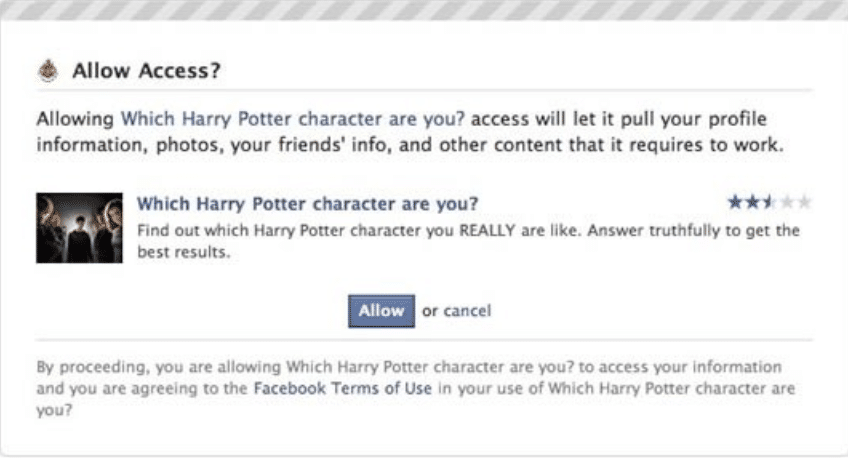
Lo and scrutinize, hundreds and hundreds of profiles ended up within the hands of Cambridge Analytica. The idea likely contained the final public profile, net page likes, and birthdays of customers, to boot as salvage true of entry to to customers’ data feeds, timelines, and messages. Cambridge Analytica would then fabricate psychographic profiles of the data matters, that might well perhaps additionally derive been feeble to manufacture the actual promoting that might well perhaps additionally affect a explicit particular person for a political occasion.
The politicians and campaigns who bought the data were within the aid of the 2015 and 2016 campaigns of Donald Trump and Ted Cruz, to boot as the 2016 Brexit vote.
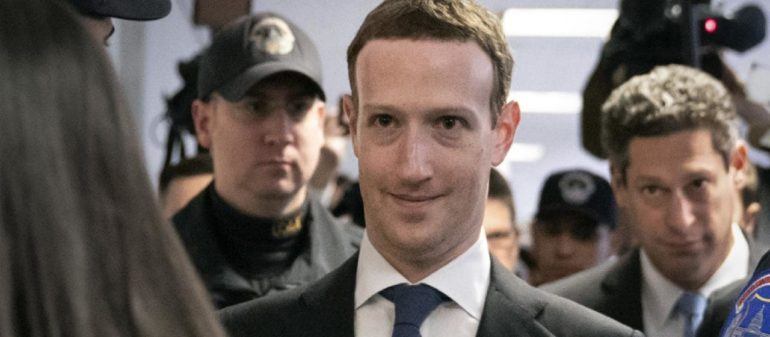
A crucial distinction many folks blur is that the Fb-Cambridge Analytica scandal wasn’t a hack. Of us voluntarily consented to quit their knowledge for something as innocuous as a quiz. Nonetheless, objective a look for within the aid of the scenes of the impacts and actions of the data financial system is all it takes to unnerve a nation.
Even worse, the credit reporting company Equifax became indubitably hacked for lots more sensitive knowledge (social safety numbers, delivery dates, addresses, etc.) of 143 million American citizens in 2017.
So, now not finest will we now not know who doubtlessly has our knowledge, but this knowledge can straight away be feeble to pry originate our bank accounts, take out loans, and salvage purchases in our title.
In the boardrooms of any publicly traded company, relish Fb and Google, a critical war of curiosity exists between maximizing shareholder tag and safeguarding their customers’ data.
With $39.94 billion and $95.38 billion in promoting income, respectively, in 2017 alone, it’s now not strong to bear in mind eventualities the put Fb and Google might well perhaps additionally derive tipped the scales in direction of income.
Although the looming likelihood of advertisers making the most of our privacy is relating to, the true hazard composed lies in third events that might well perhaps and might well perhaps additionally utilize this knowledge with contaminated intentions.
Up till now, anybody passionate about their personal privacy has been pressured with a dauntingly wretched resolution: put up with it and dwell a regular lifestyles, or forego the luxuries afforded by the Web and social media and rush off the grid.
Anonymity and data-privacy-centered blockchain initiatives purpose to present protection to your online activity, memoir knowledge, and perusing behavior from unknowingly falling into the corporate coffers, personal knowledge data markets, or the hands of malicious third events.
One such mission, the General Attention Token (BAT), helps energy and incentivize the utilization of its anonymity-centered browser. BAT’s Courageous browser utilizes neat contracts to allow advertisers to ship classified ads with locked rate tokens straight away to customers. Customers can then utilize their earned BAT on lots of issues relish top rate articles and products, donations to screech creators, data companies and products, or excessive-resolution photos.
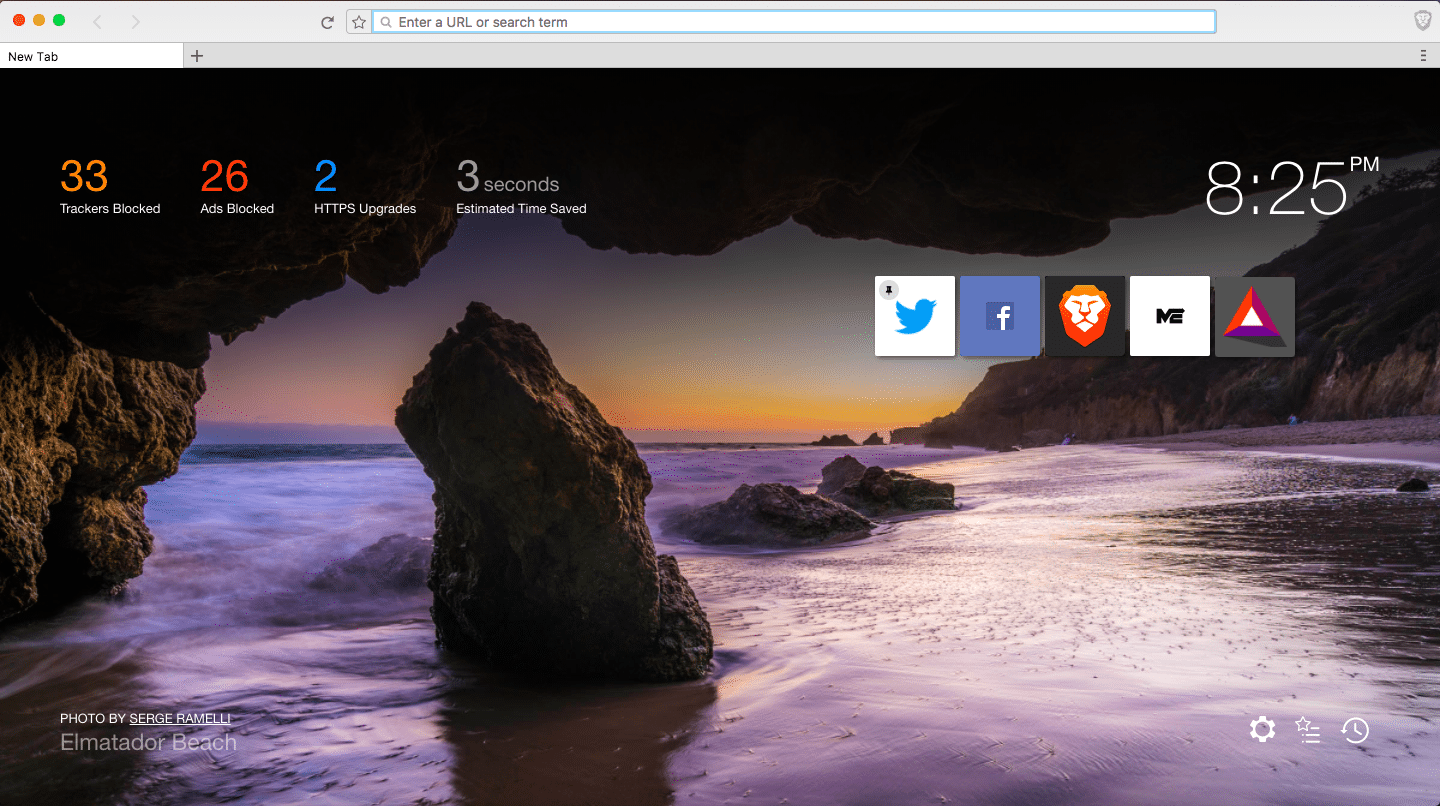
BAT, and many a form of initiatives with Fb and Google of their scopes, derive industry models that revolve round replacing the third-occasion middleman factor of ad networks. In consequence, platforms can provide a browsing or social journey without collecting or storing huge personal data.
When Files Will get Provoking ????
Be conscious the precedent space in Jones v. the US (2012), the put the government can’t invade your privacy by physically inserting a GPS on you or your like house, but all public surveillance is k?
Let’s extrapolate.
It’s estimated that there are over 40 million safety cameras within the US and roughly 245 million professionally put in video surveillance cameras globally. The video surveillance alternate is estimated to generate roughly $25 billion worldwide and rising.
The recent insist of video surveillance indubitably creates portholes all around the put the sphere. Whereas this approach-omnipresent vary of vision illuminates many sides of the sphere, the photos have to composed be watched and sifted with human eyes and squishy brains.
Advances in facial recognition utility, synthetic intelligence, and machine studying allow for transcending the barriers of the human situation. What must be done manually might well perhaps additionally very well be aggregated and analyzed by algorithms, revealing all forms of data and sample prognosis never ahead of imaginable at scale.
As an instance, let’s deliver an alert goes out shopping for a white male wearing a red shirt who robbed a gasoline diagram and left in a Dodge Durango in Austin, Texas. As antagonistic to police manually scanning by photos and staring at all cameras till they catch somebody who fits these little print, an AI/ML-backed plot would hypothetically be in a self-discipline to drag up all recent fits in valid time with a excessive level of specificity.
“We stumbled on 640,000 ‘white’, 320,000 ‘males’, 20,000 ‘with red shirt’, 40 ‘with Dodge Durango’. One is within two miles of the alert. Identification is Kyle Joseph Mitchell, height 6’2, age 31, closing self-discipline Chevron 2710 Bee Caves Rd, Austin, TX 78746, USA. Shall we proceed to phrase and issue all local models?”
Granted, we would be rather far off from this level of efficient prognosis and output, but issues salvage sophisticated if or as soon as it will get right here. China’s capital, Beijing, is for the time being one hundred p.c covered by surveillance cameras, in line with the Beijing Public Safety Bureau. Very efficient and certain, the non permanent effects might well perhaps additionally very well be elevated ranges of safety and safety, but within the scandalous hands of an authoritarian or nefarious administration or hackers, the future turns dystopian.
Files receives its tag from pairing and prognosis, and in line with safety knowledgeable Bruce Schneier, something relish our self-discipline data “finds the put we dwell, the put we work, and how we utilize our time. If we all derive a self-discipline tracker relish a smartphone, correlating data finds who we utilize our time with—at the side of who we utilize the evening with.”
Throw in some behavior prognosis and predictions, and the majority of freedoms are straight away disabled.
Machine studying depends on a virtuous cycle the put the utility improves as it collects more data, and evolved computing enables for quick data prognosis across just a few data models.
As an instance, an evolved insist of mass surveillance might well perhaps be in a self-discipline to trace something as explicit as when and the put you’re going to be pleased ahead of you even realize it by analyzing your self-discipline, time spent between meals transactions, and standard restaurant decisions.
This data seems harmless and, frankly, somewhat useless a form of than its industrial seemingly, but its implications on our psychology and freedom are mountainous.
In a TED focus on by Glenn Greenwald, the journalist finest acknowledged for his characteristic in publishing a sequence of experiences on govt international surveillance applications in line with labeled documents leaked by Edward Snowden, Greenwald notes,
“When we’re in a insist the put we might well perhaps additionally also be monitored, the put we might well perhaps additionally also be watched, our behavior changes dramatically. The vary of behavioral alternatives that we derive in mind when we judge we’re being watched severely reduced.”
Dim Replicate S04 E07: CHYYNA! 大哥
Earlier this one year, the Chinese govt implemented a plot of monitoring and grading the behavior of every citizen and assigning them citizen scores.
If a citizen does something considered as unsatisfactory, equivalent to receiving a parking ticket or protesting the government on social media, they’ll salvage about a aspects docked off their catch.
If they manufacture something favorable, relish a objective public deed or helping their household in unusually sophisticated instances, they’ll catch about a aspects.
The excessive-scoring all-stars will catch perks relish favorable bank loans or discounted heating funds, whereas their low-scoring dunces will be barred from attempting to search out certain issues, equivalent to excessive-tempo prepare tickets.
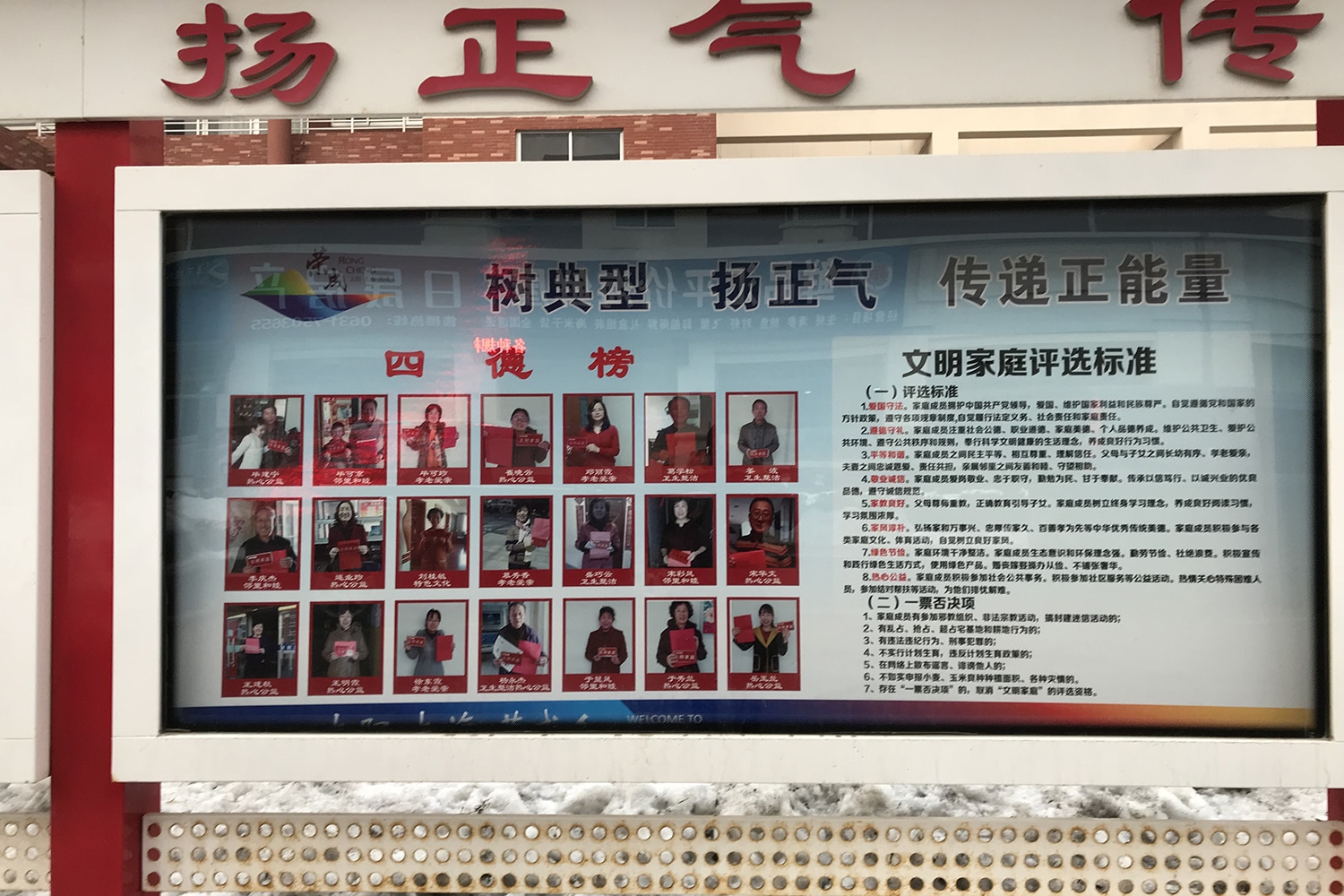
The program is for the time being being rolled out in about a dozen cities and might well perhaps additionally very well be put into fat tools as a nationwide credit plot in 2020.
Essentially essentially based fully on foreignpolicy.com, “the nationwide credit plot deliberate for 2020 will be an ‘ecosystem’ made up of schemes of a form of sizes and reaches, speed by cities, govt ministries, online rate services, down to neighborhoods, libraries, and companies, deliver Chinese researchers who are designing the nationwide procedure. This can all be interconnected by an invisible net of data.”
China, a nation that will be blanketed with almost 626 million surveillance cameras by 2020, might well perhaps derive an inordinate amount of data on the entirety its voters are doing, and indubitably pondering.
Final Tips
“Must that you simply can derive got something that you simply don’t need anybody to know, maybe you shouldn’t be doing it within the first insist.“
–Worn Google CEO Eric Schmidt in a 2009 CNBC particular “At some stage within the Tips of Google”
This appears to be like to be a regular sentiment. Must you’re now not doing something else unlawful or scandalous, why ought to composed you veil? After all, what form of human being that isn’t a assassin or drug dealer would even are searching for to exist without being watched? The lifestyles unexamined (by somebody else) is now not price living, correct?
The actual fact that there are fewer and fewer locations to veil brings up the seek data from of whether or now not now we derive an correct to veil at all.
Many cryptocurrency and blockchain advocates piece unwavering toughen for their rights to privacy. The levels of this privacy vary from a desire for data safety to an organization and resolute mission to without crash retain their identification off the grid.
Files genuinely is a poisonous asset, and any aggregator relish Fb, Google, Amazon, or even the US govt takes on a large likelihood when storing it. Over time, the data deposits change into richer and a miles more lucrative purpose for hackers.
Mass surveillance throttles our desire for experimentation, creativity, scamper, and dissent.
The accelerate for privacy isn’t lots for preventing the Donald Trump marketing campaign from luminous you’re a Hufflepuff ought to you’ve been telling all americans you’re a Gryffindor. It’s for holding your future and that of the next generations from being born in an international that is stifled by transgressions gone unaddressed.
If the quick evolutions in synthetic intelligence are any indicator, a future built without a sturdy foundation for private human privacy is a provoking insist.
Luckily, many folks dwell in international locations the put we composed derive a deliver to argue citizen scores and the relish. Nonetheless, many of the freedoms we might well perhaps be so rapidly to fight to present protection to are slowly escaping us below the veil of frigid new social platform aspects and sporadic govt-orchestrated data heists.
Privacy-centered blockchain initiatives remove the need for a government, to boot as the burden of safety for data. These alternatives can prevent one other Equifax hack from going down, which is already a huge tag-add.
If there is a seek data from for elevated privacy, opponents will come up to present it. That’s, if truth be told, if that more than just a few is frictionless to adopt. (*hint* hello blockchain entrepreneurs, utilize less time on jargon-infested cleaning soap opera whitepapers and more on UI/UX).
Nonetheless, the brand new insist of privacy blockchain innovation is downhearted at finest. Essentially essentially based fully on Ethereum Co-Founder Vitalik Buterin in “Privacy on the Blockchain,”
“It’s far more difficult to manufacture a ‘holy grail’ abilities which enables customers to manufacture absolutely the entirety that they’ll manufacture correct now on a blockchain, but with privacy; instead, developers will in quite lots of cases be pressured to deal with partial alternatives, heuristics and mechanisms which might well perhaps be designed to carry privacy to explicit classes of applications.”
For now, the actual we can manufacture is phrase and take a look at privacy-centered alternatives relish little saplings. The elevated the seek data from for privacy, the elevated the funding in consideration and capital wanted to form a passable more than just a few.

Whereas our correct to privacy is consistently being made up our minds by a form of court docket cases, we ought to composed be asking ourselves the seek data from of whether or now not we if truth be told need it.
In an international the put we’re so rapidly to quit our Fb profile data for something as meaningless as a Harry Potter persona quiz, or our fingerprints to Apple, or even our at-house conversations to Amazon, it’s sophisticated to set up mass adoption of a privacy more than just a few for our transactions or browsing.
We’re so without issues prompted by the postulate of our govt overstepping its jurisdiction into our non-public lives.
- Mandatory thumb-prints? Nuh uh.
- Fixed self-discipline tracking? No plot, Jose.
- A speaker in our house that listens to our conversations? Absolutely now not.
Nonetheless, for Apple, Fb, Google, and Amazon, we’re rapidly to volunteer without any additional solutions.
More crucial than any quick privacy solution is the company idea of why privacy is simply too crucial to lose stare of.
Withhold your self inspiring by following enormous privacy cases as they’ll inevitably continue to appear, educate your self on what steps that that you simply can take at the moment time to encrypt your lifestyles, and repeat Alexa to piece this article.
You gotta fight to your correct to be non-public.
Additional Reading:
Get out how to encrypt your complete lifestyles in lower than an hour
Files and Goliath: The Hidden Battles to Dangle Your Files and Withhold an eye on Your World
Never Omit Yet one more Replacement! Web hand selected data & data from our Crypto Experts so that that you simply can salvage educated, instructed decisions that straight away derive an affect on your crypto earnings. Subscribe to CoinCentral free e-newsletter now.


